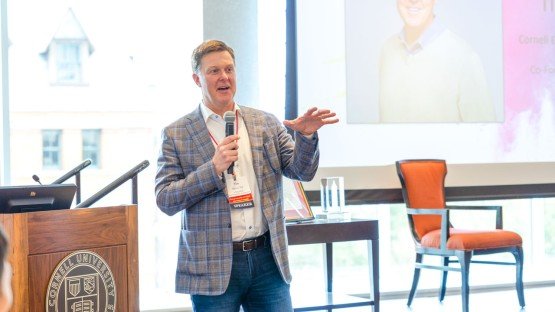Over two days, April 11 and 12, more than 300 people participated in campus activities celebrating Cornell entrepreneurs, including an event to recognize Tim Barry, Class of 1993, as the 2024 Cornell Entrepreneur of the Year.
Cornell’s celebration of entrepreneurship also included speakers and events exploring everything from artificial intelligence to investing in tech startups to building a more inclusive entrepreneurial community.
“Our annual event gives our graduates an opportunity to witness the entrepreneurial energy we see every day in our classes on campus and in the many entrepreneurial activities and organizations,” said Cornell University Director of Entrepreneurship Zach Shulman (Class of 1987, J.D. 1990). “In addition, we honored Tim Barry, who truly is an exemplary Cornell entrepreneur. His passion for improving the nation’s health care system is palpable and genuine.”
Barry, founder and CEO of VillageMD, shared his story of the ups and downs of his entrepreneurial journey.
“We wanted to tap into a market sentiment that many physicians feel: I’m on a hamster wheel and not being given the opportunity to provide the care I learned about in medical school,” Barry says. “I want something better. I want to focus on the best outcomes for my patients, not on whether I refer them to the hospital cardiology group to keep them as ‘family.'”
The 4,000 physicians who work with VillageMD in 16 markets are “passionately” focused on providing the best care to patients, working with nutritionists, pharmacists, social workers and the patients themselves, especially those with chronic conditions, Barry said.
“There’s a lack of health equity in our health care system, and we’re trying to address that,” he said. “Our 20,000 employees are really connecting with people every day and trying to understand them. We use the word ‘love’ a lot at our company, because people need to feel loved.”
Master’s student Will Hasapis said he came to hear Barry speak because VillageMD is doing work he believes in.
“It’s really moving to hear him talk about things like this,” Hasapis said. “It’s a sad reality of the way our health care system is right now, but it’s good to know there are people out there making change and who believe change is possible.”
Another highlight of the celebration was eLab Demo Day, an event held on April 11 where 17 Student Business Accelerator teams shared their progress this year. The teams were selected from 80 applicants in the fall and have been working to grow their businesses by taking classes, participating in mentoring opportunities, practicing presentations, customer discovery, marketing and sales.
“Starting a company is hard. You have to pick a great problem, build a great team, try ideas that don’t work over and over again, and think long and hard,” said Christine Van Vliet, Cornell’s vice provost for research and innovation and professor of materials science and engineering, who welcomed the crowd to the event and called it the perfect place to develop their ideas. “The people at Cornell really embody the mission that the time we spend on research — the effort we put into translating that research into world-changing results — should be for the greatest good.”
Student teams presented businesses offering everything from food to software to agricultural production systems. For example, Phytoflock, developed by MBA student Albert Charles, uses grape waste as a chicken supplement to reduce the need for antibiotics. CranioMag, founded by Cornell Medical School student Kyle Zappi, is developing a less invasive device to correct craniosynostosis, a birth defect that affects the growth of the skull.
On Friday, attendees took part in a variety of morning panels, including one focusing on startups emerging from university-led research.
“I’m so proud that Cornell is supporting entrepreneurs and hearing how valuable and important these new products are,” said Marilyn Laverty (Class of 1976), a Cornell philosophy major and member of the Entrepreneurs Advisory Board who describes herself as an “accidental entrepreneur” after working as a publicist for a major record company and starting her own company, Shore Fire Media.
“I think for this generation of students, doing something adventurous or doing something for themselves isn’t as intimidating as it was for another generation of students like us.”
During Friday’s luncheon, Aunt Flo’s Kitchen, founded by computer science major Armita Jamshidi (MEng ’25), was named the 2024 Student Business of the Year, and Esger, whose CEO is Advite Laker (MEng ’23), was named the winner of the BenDaniel Venture Challenge.
The final event of the conference was an “Inspiring Futures” reception hosted by a group of staff funded by a grant from Cornell’s Center for Technology Licensing (CTL) and the Cornell Women Presidents’ Council. During the reception, attendees were encouraged to reflect on the challenges founders face and brainstorm ways they can personally build a more inclusive entrepreneurial community.
“We hosted the gathering to raise awareness of the opportunities available to Cornell founders, encourage broader access and participation, and ensure aspiring entrepreneurs feel supported,” said Linda Insek, CTL’s director of technology and venture initiatives and engagement.
LeeAnn Roberts, director of diversity, equity and inclusion at Cornell University’s Ann S. Bowers School of Computing and Information Sciences, said the event inspired business leaders to think about diversity, equity and inclusion in a new way. “It gave us a way to bring ideas like diversity of ideas, diversity of thought, diversity of products and serving diverse communities into conversations about entrepreneurship,” she said.
Participants brainstormed actions the university and individuals could take to support and encourage underrepresented groups in entrepreneurship and diversify Cornell’s entrepreneurial ecosystem. Prizes included a bag filled with products created by Cornell founders.
“Cornell University is Zach’s [Shulman’s] “As Cornell pursues its vision of becoming a top-three college destination for entrepreneurial students, we have a tremendous opportunity to lead the way by supporting a diverse group of founders, which will ultimately lead to greater innovation and impact,” said Christa B. Downey, director of Cornell’s Engineering Career Center.
Cathy Hovis is a writer in the College of Arts and Sciences.

